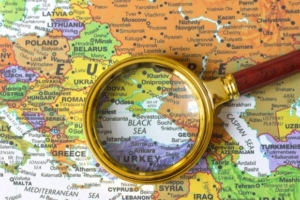Insurers are reviewing the risks on the Black Sea routes. A lesson for the Baltic shipping
 Source: www.insurancejournal.com
Source: www.insurancejournal.com
By Marek Grzybowski
Insurance companies announced that they were considering the possibility of reviewing the risks in relation to shipowners directing ships to the Black Sea, even before the grain agreement expired, allowing for the export of grain from Ukraine by sea. This clearly means that sea transport is facing an increase in insurance rates for the ship and cargo. This is a wake-up call for shipping in the Baltic Sea.
Attacks on Odessa and Ukraine’s military facilities and infrastructure located within its borders with cruise missiles and kamikaze drones mean that the risk of a breakdown in shipping to Ukrainian ports has become real. The Kerch Bridge has been damaged by floating drones, which means that the conflict has escalated again at sea.
In the second quarter of 2023, there were more than 1,200 location manipulation (GNSS) incidents by ship operators worldwide. 63% of all ships circumventing the sanctions were identified as linked to Russia. These are two of the many noteworthy insights from a risk report by Windward, which tracks ship movements using Maritime AI™.
War on the Black Sea
Russia has announced that every ship carrying Ukrainian grain will be destroyed. Ukraine has announced that it will attack Russian merchant ships because they are carrying weapons to Russia. After such declarations by Russia and Ukraine, no ship can feel safe in the Black Sea. Even the one flowing with Ukrainian grain from the ports of Romania or Bulgaria. After such declarations, no ship sailing to Russian ports or to Kerch Strait will be able to feel safe.
Directing ships to the Black Sea routes has become risky, because an attack by Russian ships and retaliation by Ukrainian forces can be expected against ships providing connections with ports in Russia and Turkey supporting the avoidance of sanctions [see: https://www.gospodarkamorska.pl/afrykanskie-zjake-i-european-dziury-w-sankcjach-rosyjskie-towary-plyna-na-all-rynki-szerokim-strumiienie-72416 ].
“Shadow” ships on the Black Sea
Although these are often “shadow” ships, they can be real objects of missile attack or armed drones.
As soon as Russia announced its withdrawal from the UN-backed deal that allows grain exports through a designated Black Sea Corridor, it became clear that the conflict would once again widen to the sea and ports. All parties to the conflict benefited from the agreement. And it’s no secret that the export of Ukrainian grains has not led to a radical mitigation of the global food crisis.
And although, according to the UN, thanks to the grain corridor, grain prices decreased by more than 20%, the poorest countries were not the main recipients of grain. Operators, shipowners and forwarders, as well as ports that reloaded grain from Ukraine, including receiving and protecting “gost ships”, benefited from their transport.
High-risk Ukrainian ports
“Due to the collapse of the Black Sea Corridor agreement, most shipowners will now not call at Ukrainian ports,” Christian Vinther Christensen, chief operating officer of the Danish shipping group NORDEN, told Reuters.
Marsh & McLennan Cos. Inc. already announced in June that it will design a risk data platform to enable insurers to assess and make financial projections for the transfer of war risk in Ukraine.
This is part of a broader initiative to work with the Ukrainian government to help Ukrainian companies and their supporters gain access to the global insurance market. These actions follow the announcement of the British Prime Minister Rishi Sunak regarding new conditions of insurance against the risk of war.
Insurance support for Ukraine
Ukraine received the support of a strong partner with experience in analyzing economic risks. Marsh McLennan (NYSE: MMC) is the world’s leading professional services firm in the areas of risk and strategy design.
Over 85,000 of the company’s employees advise clients in 130 countries. With annual revenues in excess of $20 billion, Marsh McLennan helps companies operate in a dynamic and volatile economic and political environment.
– The data platform will put insurers in a better position to offer commercial insurance in Ukraine, Marsh McLennan said in a statement and emphasized that “Services will be provided on a pro bono basis.”
“With the withdrawal of Russian security guarantees, the risk profile needs to be reassessed,” said Neil Roberts, head of the marine and aviation division at Lloyd’s Market Association, which represents the interests of all insurance companies at Lloyd’s.
Baltic shipping without risk?
Observation of what is happening in the waters of the Black Sea and the Sea of Azov should give much food for thought to operators operating in the Baltic Sea, which is also a closed sea and where Russian ships also sail.
It is interesting that the diversion on the Nord Stream 1 and Nord Stream 2 gas pipelines did not provoke a major reaction from insurance companies. However, NATO has increased its vigilance, organizing sea exercises of international fleets aimed at securing sea routes and the interests of the Baltic states.
NATO increases naval forces in the Baltic Sea
The enlargement of NATO by the countries located on the Baltic Sea and the increased involvement of the Baltic countries in military support for Ukraine may result in the fact that the Baltic Sea may suddenly become a basin with a navigation risk similar to that of the northern regions of the Black Sea.
One unusual incident with a merchant ship or in a port is enough.
The fact that the perpetrators of diversions on gas pipelines have not been detected so far means that a similar situation can be encountered on shipping routes.
Insurance companies did not react nervously after point damage to pipelines. Have we learned the lessons from the situation in the Black Sea? Are we prepared for war risks in the Baltic Sea? I leave the answer to analysts and readers.
More:
